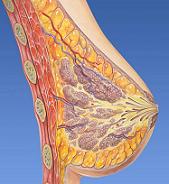New approaches in breast cancer management may lead to exciting new nonsurgical tools
Feb 12, 2007 - 3:21:52 AM
, Reviewed by: Dr. Rashmi Yadav
|
|
|
"As we progress into the 21st century new treatment schema and devices outside of the surgical arena may significantly alter current practices."
|
By John Wiley & Sons, Inc.,
[RxPG]
 |
| Current research in the fields of radiology, drug therapeutics, and vaccine development has great potential to change breast cancer management. |
Aggressive research currently underway brings hope of dramatic advances in breast cancer management, according to a new review. Published in the March 15, 2007 issue of CANCER a peer-reviewed journal of the American Cancer Society, the review reveals that new approaches in breast cancer imaging, investigations into the timing of chemotherapy, and research on breast cancer vaccines may lead to exciting new nonsurgical tools for the physician treating breast cancer patients. These new tools may significantly alter current screening and treatment paradigms used by surgical oncologists, as well improving the care of patients.
Our understanding of breast cancer has changed since Dr. William Halsted started performing radical mastectomies in the 1880s. Advances in genetics, immunology, and cell biology have demonstrated that breast cancer is not a single disease, but a complex family of diseases that requires fine-tuning of treatment at the level of the each individual patient. The current multidisciplinary approach to breast cancer treatment�surgery, radiotherapy, chemotherapy, hormonal therapy, targeted therapy�will continue to evolve as our knowledge of the disease grows.
S. Eva Singletary, M.D., F.A.C.S, a surgeon from the University of Texas M. D. Anderson Cancer Center in Houston, discusses the latest research in breast cancer screening and management in this new review. "As we progress into the 21st century," she writes, "new treatment schema and devices outside of the surgical arena may significantly alter" current practices.
She finds that current research in the fields of radiology, drug therapeutics, and vaccine development has great potential to change breast cancer management. In radiology, 3-dimensional digital mammography, color doppler ultrasonography, and other more sophisticated technologies, such as magnetic resonance imaging (MRI), are being refined to more accurately identify the size and location of tumors, and to distinguish between benign and malignant lesions. The use of nanotechnology may provide safer imaging that capitalizes on our growing knowledge of specific genes associated with cancer.
In the area of systemic therapy, the timing of drug treatments is being altered to maximize cell death, "short-circuit" tumor growth, and minimize toxicity to the patient. Though early in development, vaccines that stimulate the patient's own immune system to attack developing tumors are being tested in animals with encouraging results. Preliminary clinical trials in breast cancer patients have also shown promising immune responses, although much remains to be done in this complex, but promising, area of research.
"During the lifetime of most surgeons practicing today," Dr. Singletary writes, "we have seen breast cancer management evolve dramatically from a paradigm centered on radical surgery to one that involves the synergistic combination of multidisciplinary approaches." She concludes, "It will be important for surgeons to stay aware of all developments that may improve the care of their patients, and to be true surgical oncologists rather than merely surgical technicians."
Advertise in this space for $10 per month.
Contact us today.
|
 |
|
Subscribe to Breast Cancer Newsletter
|
|
|
|
About Dr. Rashmi Yadav
|
This news story has been reviewed by Dr. Rashmi Yadav before its publication on RxPG News website. Dr. Rashmi Yadav, MBBS, is a senior editor for RxPG News. In her position she is responsible for managing special correspondents and the surgery section of the website. Her areas of special interest include cardiothoracic surgery and interventional radiology.
RxPG News is committed to promotion and implementation of Evidence Based Medical Journalism in all channels of mass media including internet.
|
|
Additional information about the news article
|
Article: "Multidisciplinary Frontiers in Breast Cancer Management: A Surgeon's Perspective," S. Eva Singletary, CANCER; Published Online: February 12, 2007 (DOI: 10.1002/cncr.22519); Print Issue Date: March 15, 2007.
|
|
Feedback
|
For any corrections of factual information, to contact the editors or to send
any medical news or health news press releases, use
feedback form
|
Top of Page
|



